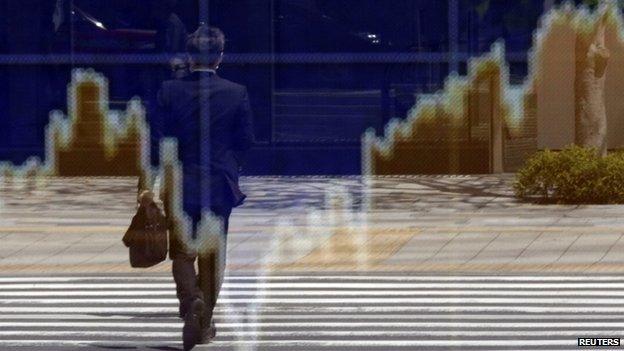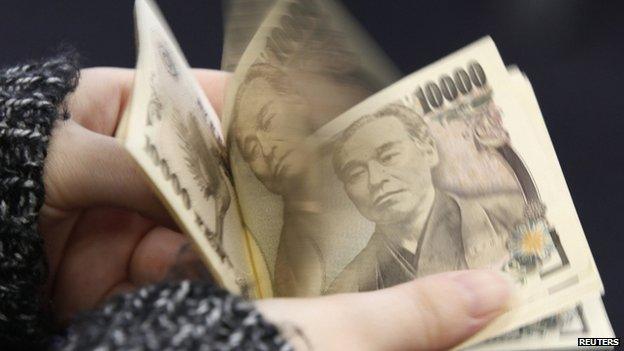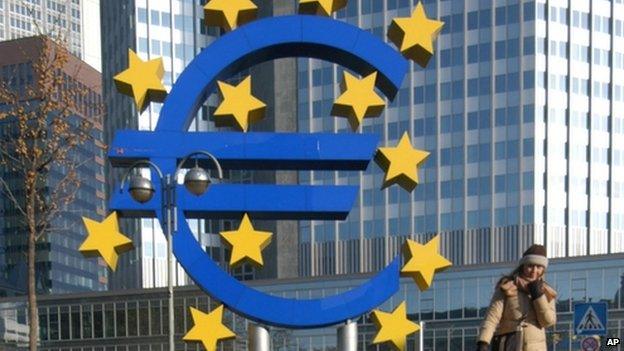How the forex scandal happened
- Published

Foreign exchange trading involves huge sums of money
The foreign exchange, or forex, market is a virtual trading place where dealers buy and sell currencies.
Deals at today's price are called the "spot" market and bets can also be made on forward exchange rates.
In all, $5.3 trillion (£3.3tn) was traded per day on the forex markets in 2013, according to the Bank for International Settlements.
To put that in context, that's just over double the annual economic output of the UK, which was $2.52tn in 2013, according to the World Bank.


Why is it so big?
Currency trading started out as a way for businesses and individuals to change money for overseas travel and commerce. This was a real service industry driven by the underlying level of world trade.
Opportunities for speculation were limited by the Bretton Woods agreement in 1944 to peg exchange rates to the gold price. In the early 1970s, this accord broke down, exchange rates began to fluctuate more widely and globalisation created more underlying demand for foreign exchange.
Financial institutions saw a new opportunity to make money from the increased size and volatility of the forex market. Today only a fraction of currency trading is directly related to the original purpose of facilitating cross-border trade: the rest is speculative.

How does it work?

In most forex trading, no physical money actually changes hands
There is no physical forex marketplace and nearly all trading takes place on electronic systems operated by the big banks and other providers.
Dealers display the prices at which they are prepared to buy and sell currencies: users place orders with the click of a mouse.
Prices change according to supply and demand. For example, if the US dollar is more popular than the euro at any given time, the dollar will strengthen against the euro and vice versa.
Prices are constantly changing on a second-by-second basis as currencies respond to the changing flow of economic news.
About 40% of the world's dealing goes through trading rooms in London.


What is the fix?
Prices in the forex market change so rapidly that it is difficult to establish the going rate for particular currencies at any one time. In order to help businesses and investors value their multi-currency assets and liabilities, a daily exchange rate fix is held.
Until recently, this was based on actual currency deals that took place in a window 30 seconds before and 30 seconds after 16:00 London time. WM-Reuters then calculated the fix rates based on these observed transactions, which form the benchmarks for that day.
The probity of this public information is very important, as it is the peg on which many other financial markets depend.

How was the fix rigged?
Because the fix was based on actual transactions over a short period of time, the potential existed for market players to get together and place orders during the 60-second window.
If they were big enough, they could affect the benchmark calculation and create profit opportunities for their firms.
Last November, regulators said that some forex traders at five of the biggest banks had been doing just that for several years. They concluded that through online chat rooms with exotic names such as The Bandits Club, The Cartel and The Mafia, traders colluded to place aggressive "buy" or "sell" orders - known in the business as "banging the close"- in order to distort the fix.

Shouldn't it have been detected sooner?

Suspicious movements in the prices of major currencies indicated that something was wrong
This had apparently been going on for several years. Embarrassingly for the managers meant to have been in charge of the traders, suspicious price movements were first highlighted by a whistleblower.
Clues that were available to outsiders should have been picked up internally long ago, but prime responsibility lies with those who participated directly.
The practice appears to have been so common amongst influential traders that the phrase Warren Buffett described as the five most dangerous words in business, "everyone else is doing it", comes to mind.

Has any action been taken since?
The Financial Stability Board, a watchdog that advises the G20 finance ministers, has set up a task force to recommend reforms of the forex market. As a result, the window in which the daily 4pm fix is calculated has been extended from one minute to five minutes. This makes it harder to manipulate.
In addition to the five minute fix, the central banks' co-ordinator - the Bank for International Settlements - is trying to get all the banks to agree a unified code of conduct, but this has not yet been settled.

Was there a regulatory failing?
Ironically, the forex market had been considered by regulators too big to be manipulated and it has been largely unregulated. Yet there were some early warning signs that all was not well.
Minutes of a meeting of dealers at the Bank of England back in 2006 appear to suggest that the possibility of market manipulation was discussed in front of officials, but the Bank of England denies this interpretation. Nine years on, it has led global regulators in cleaning up the forex market - and not before time, critics will say.

Can such scandals be prevented?
Institutional cheating of the kind we have seen in the Libor and forex scandals will probably die out for a while.
Individual traders have seen colleagues marched off the trading floor to face questioning.
Managers have finally understood the need for line-by-line, desk-by-desk scrutiny.
Regulators now know that light-touch regulation was an invitation to the financial services industry to game the rules and they have responded with more intrusive supervision and hefty deterrents.
Against this background, it would be surprising if systemic malpractice were to continue in the immediate future. But there is no room for complacency in an industry where corporate memories are short and rewards for beating the market are great.
Philip Augar is a former investment banker and the author of several books on the City.